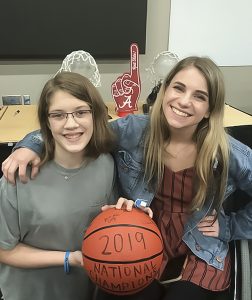UA wheelchair hoops player forms lasting friendship, mentorship with camper
By David Miller

Sarah Maynard and Mary McLendon text and Snapchat each other regularly, updating one another about their personal lives and successes on the basketball court.
Friends stay in touch, and it’s no different for Maynard and McLendon, though Maynard is nearly eight years older than McLendon.
Their relationship is as much of a mentorship as it is a friendship, one that began unexpectedly when they met three years ago at The University of Alabama.
Maynard, a junior journalism and creative media major from Texas, plays wheelchair basketball for UA’s Adapted Athletics program. She was working the program’s annual camp and met McLendon, a camper and newcomer to the sport from nearby Helena.
McLendon learned the basics that summer, particularly how to maneuver in a sports chair, a critical building block, as she has cerebral palsy but doesn’t use a wheelchair day to day.
“It was definitely hard at first, because I’d never been in a chair before,” McLendon said.
McLendon has camped each year since and will return to camp later this month, where she’ll reunite with Maynard and continue refining her turns, pushes and stops, while adding college-level nuances to her game.
McLendon’s basketball ability has improved mightily, Maynard said. She’s been able to watch McLendon play at camp and at Lakeshore Foundation, a little over an hour’s drive from Tuscaloosa.
“This girl impresses me a lot,” Maynard said. “She used to get a lot more frustrated at herself, but she’s grown so much in her confidence. She plays with a bunch of boys – that’s how juniors [league] is – and I know how frustrating that can be, but it lights a fire under her.
“She has a crazy promising future in this sport, and I tell her all the time.”
McLendon’s and Maynard’s basketball careers have progressed congruently, as Maynard entered UA a shy, relatively inexperienced player after picking up the sport during her junior year of high school. She’s now a more confident player and extremely passionate about the game.
“I didn’t know how much this would make you grow up,” Maynard said. “Everybody is like, ‘between you and Mary, you two have both broken out of your shells.’ I feel like Mary has helped me as much as I’ve helped her. It gives me inspiration to play whenever she says they’ll be watching me.”
McLendon swam for two years at Lakeshore and was urged to give basketball a try after watching former Lakeshore track-and-fielder and UA basketball player Rashad Bennett. She was eager to return to the sport after playing in her church league for three years, where cerebral palsy limited her athleticism in the stand-up game, said Emily McLendon, Mary’s mother.
Having a mentor in wheelchair basketball has been vital, as outlets for competition are typically scarce, Emily said. Maynard has helped accelerate Mary’s growth as a player and has been an invaluable local role model.
“I think it’s really special,” Mary said. “Not a lot of people have that. I have that person I can count on to let me know what I’m doing wrong, what’s working for me, whether I have a good game or bad game. That’s special.”
Maynard is happy to be the mentor that she needed when she was injured at age 13.
“It was an awkward age,” Maynard said. “It wasn’t until I was 17, when I met people in the sport, and I saw how they lived and how they were OK with being disabled. It helped with lifestyle and with the sport — girls in wheelchairs still do play wheelchair basketball, and there wasn’t a big stigma around it.”
